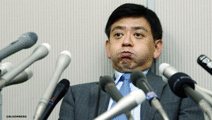
Recent weeks have been tricky for investors in almost all markets, but for Japan bulls they’ve been especially painful. As Louisa Gault notes in The Sunday Telegraph, “Japan has been the worst-performing market among the developed nations since the turmoil in worldwide equity markets began.” The Nikkei has now dropped by around 20% since April, against a near 10% fall in the FTSE.
On top of the familiar global worries, markets were unsettled by the arrest last week of high-profile fund manager Yoshiaki Murakami. Murakami is being linked to allegations of insider trading in a hostile takeover bid orchestrated by Takafumi Horie, another controversial businessman who was arrested earlier this year. Some opposition politicians are calling for the Bank of Japan governor to resign because he had invested in Murakami’s fund, which added to the uncertainty.
The arrest is a blow to a “brash new class of activist investors who are trying to shake up Old Japan”, says Michael Sheridan in The Sunday Times. In fact, since Horie and Murakami were in the vanguard of the movement, it is “a source of quiet satisfaction to the old elite” that the charges link them together in wrongdoing as well. However, regardless of what these two individuals may have done, it’s important that the new breed of activists lives on, says The Economist. “If the downfall of Messrs Murakami and Horie allows Japanese companies to return to the sleepy world in which minority shareholders could be safely ignored, the entire country could suffer.”
But aside from the uncertainty of these arrests, how is Japan doing? Not badly, it seems. Latest business data provide “evidence that the underlying economic recovery remains on track”, says David Pilling in the FT. Machinery orders were very strong and bank lending continues to rise. And while investors are fretting that the Bank of Japan could raise rates aggressively, these fears are exaggerated, says Anatole Kaletsky in The Times. Policymakers are indicating that they will act cautiously and, for the time being, inflation and growth don’t justify large hikes. Rates may “not rise above 1% for the rest of the decade”, which would help underpin markets.